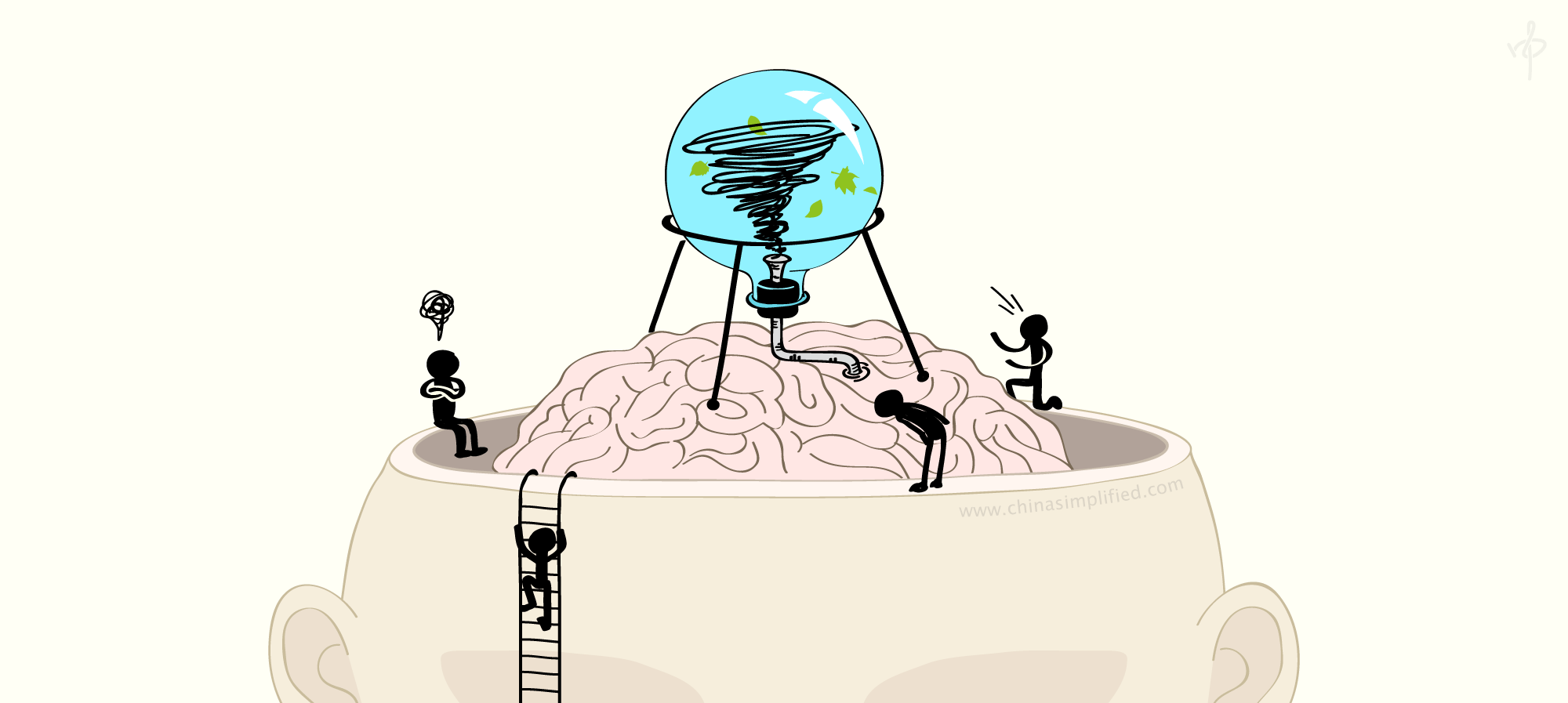A mix of generations and cultures in today’s China makes creative endeavors such as team brainstorming all the more interesting. The traditional perception of Chinese being more reserved and Westerners being more participative is no longer valid. And while there are plenty of posts out there on brainstorming techniques, we’d like to explore how the fast changing relationship between China and the rest of the world is driving a convergence of collaborative styles.
INSIGHT #1: Appreciate the “Modesty Gap”
Layers of filtering, quietness and modesty in brainstorming (脑力激荡 nǎo lì jī dàng or 头脑风暴 tóu nǎo fēng bào) sessions can be quite revealing in terms of age. The older generation of Chinese generally prefers to appear modest rather than self-assured. Even when contributing well-thought-out ideas, they tend to preface their opinions with statements reflecting a degree of modesty:
我来抛砖引玉 wǒ lái pāo zhuān yǐn yù
“I’m just tossing (shabby) bricks for (your fancy) jade.”
Underlying meaning: Please lower your expectations for what I’m going to say, while I hold high expectations for your contribution. This is one of our China Simplified team’s most used phrases!
那我就随便说说 nà wǒ jiù suí biàn shuō shuō
“I’m just shooting from the hip.”
Underlying meaning: In case this sounds stupid, that’s because I haven’t thought it through yet. Chinese almost always filter before speaking, so in a subtle way, this sets up the notion that if this is a brilliant idea, it’s because I’m smart.
只是我个人意见 zhǐ shì wǒ gè rén yì jiàn
“It’s only my personal opinion…”
Underlying meaning: So please don’t judge it good or bad.
仅供大家参考 jǐn gōng dà jiā cān kǎo
“This is only for your reference.”
Underlying meaning: Here’s my two cents.
欢迎拍砖 huān yíng pāi zhuān
“Feel free to smash my ideas with bricks!”
Underlying meaning: Welcoming comments from others, an expression borrowed from a common blog post closing.
Contrast this with the younger generation, which feels free to exhibit more openness and assertiveness in their statements. There are exceptions, of course, but the generation gap is certainly there.
“In our first week working together, our visual artist, Kanzhen, asked for feedback on an illustration with this respectful email in Chinese: “Here is the humblest of my humble pieces of work to which I invite your most wise review.” I thought to myself, “Oh no. I didn’t know this is how I’m meant to talk. They must think I’m a horribly rude human being for not sounding ‘polite’ or ‘low key’ enough.” That impression of modesty has stuck with me till this day.”
– Li Wei, China Simplified team
“I belong to a watershed post-80 generation of the Chinese (born in 1980’s decade). The post-70 and older are modest, low key and grounded. The post-90 and younger are confident, self-centric and liberated. I tend to be modest when with the older generation and bold when with the younger one.”
– Kanzhen, China Simplified team
INSIGHT #2: Avoid East/West Thought Traps
“Chinese are quiet/inscrutable/reserved…”
“Westerners are direct/expressive/overconfident…”
Unfortunately, these commonly-held views are becoming less and less accurate.
Chinese do tend to filter their thinking, discard the average ideas and share those in which they feel more confident. Westerners in the spirit of brainstorming, are more comfortable allowing the group to filter their thinking and trying to spark ideas with others. That said, many foreigners have adopted the habit of coming across as more modest, a Chinese virtue, while more and more Chinese professionals are able to toggle their discussion approaches between local and global styles.
“I used to think all Chinese would be modest, but they’re not. Sometimes quietness is misunderstood as modesty or an issue of confidence, but it’s actually more about face – coming up with original ideas and filtering them to make sure they’re good.”
– Christine Ng, Managing Director, BBH China
INSIGHT #3: Welcome the Unspoken Jewels
Some participants may be intimidated by the presence of a big boss. Others feel less confident jumping into a fast moving conversation in their second language. Nonetheless, your team’s best idea might strike like a bolt of lightning from someone who’s yet to contribute.
7 Action Steps to maximize you team’s creative output:
- Design your brainstorming rules to encourage everyone to speak. If necessary, go around the table asking for people’s input.
- Make direct eye contact with your quieter team members and ask, “Do you agree?” Offer them an opportunity to further develop other’s ideas.
- Switch to another language or dialect to elicit unselfconscious input. Don’t let speaking barriers limit your output.
- Use a flip chart or whiteboard so people can sketch or rough out their ideas as images. Experiment with different modalities
- Count silently to five after asking for more input before moving on to the next topic. Give people plenty of space to jump into the discussion.
- Get people to speak in pairs in large group discussions, eliciting a higher volume of ideas and increasing the fun factor.
- Read the silent expressions in the room (when others are speaking) to get a sense of any unexpressed viewpoints. Don’t always rely on the verbal exchange.
“I find that people here have plenty of good ideas. Sending out an agenda and a brief of meeting guidelines in advance establishes your creative expectations and helps everyone to contribute.”
– Mary Rezek, Founder and Principal Consultant, Saatori Ltd.
At their best, innovative multicultural, multigenerational environments offer participants latitude to go beyond their normal creative capacities and feel the excitement adding real value. We hope the suggestions above spark even more inventive ways for you to leverage the contributions of all your team members.
Welcome to our brave new world of cultural convergence.










Great post. Another point that works well in brainstorms is to allow everyone to write down their thoughts quietly first before starting the discussion so that they feel they have time to digest– and it will give them a readily available comment to contribute so they are more willing to volunteer